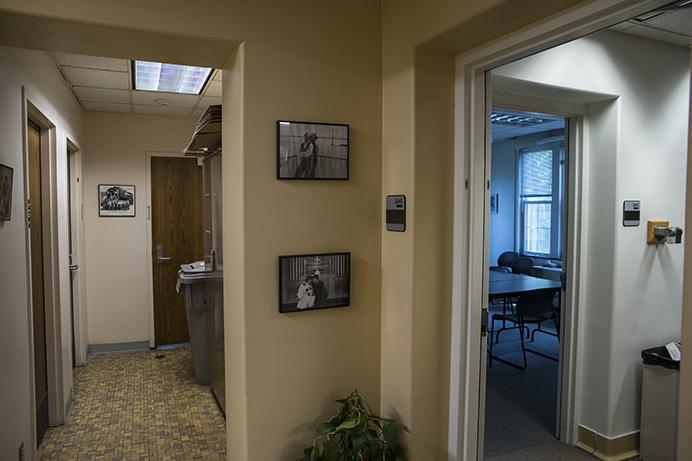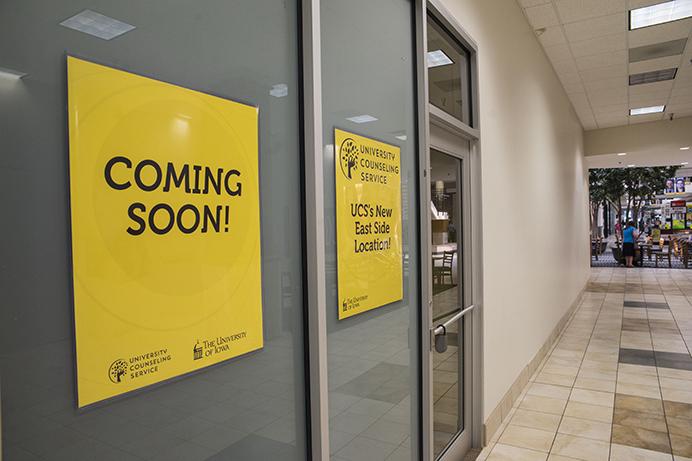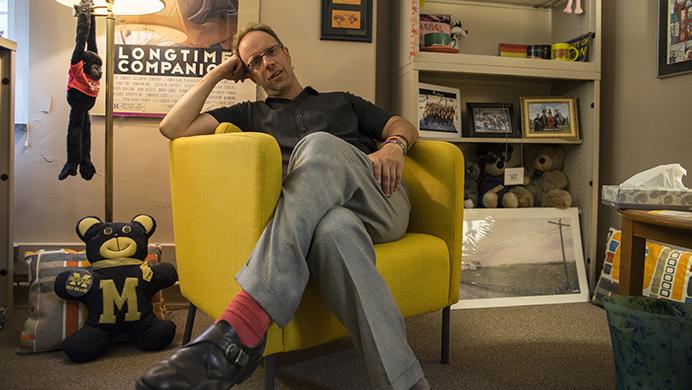UI Counseling heads east
University Counseling Service will add a second main location on the East Side of campus in an effort to increase accessibility and eliminate barriers to mental-health treatment.
The Daily Iowan; Photos by Ben S
Barry Schreier, Director of University Counseling Service, sits inside his office at Westlawn on Wednesday, July 5, 2017. Shreier obtained the directorial position two years ago following a move from Princeton, NJ. UCS will be moving to the Old Capitol Mall later this month, allowing for ease of access for students who live on the East side of campus. (Ben Smith/The Daily Iowan)
July 10, 2017
The University of Iowa University Counseling Service is expanding its footprint to create a new location on the East Side of campus in an effort to boost accessibility for students.
The service will add a second main location at the site of the old UI QuickCare in the University Capitol Center.
Counseling Service Director Barry Schreier said the additional location — its fifth location overall — is set to open around Aug. 1 with an open house likely taking place in early September.
By extending its services across the campus, Schreier said, the goal is to create more convenience and options for students seeking greater access to the service. He predicts the newest location will bring increased availability with more students accessing counseling.
“We’re only going to get busier,” he said. “I think more students will seek out service. I think the presence of the office on the East Side is going to attract a lot of walk-by attention. If you come over to the West Side, it’s kind of a destination; no one’s just walking by the West Side location …”

Associate Director Paula Keeton, the director of clinical services, will be in charge of the East Side location. She said the geographic accessibility will be a key feature of the new location, especially for students studying in colleges located on the East Side, such as the College of Engineering and College of Education.
Adding a second main location prompted a discussion about the service model, Schreier said. Service options will remain consistent across the main locations. Students may be referred to another location, but they will ultimately be able to decide where they would like to be seen.
“We’re going to open with a very similar service model, so whether you show up at the front door of the East Side or West Side location, you’re going to be offered the same service options,” he said.
Students may be seen at another location based on which Counseling Service staff member the student prefers to work with or the difference in waiting times.
Four Counseling Service staff members will work at the East Side location, Schreier said, with two of those hirings being new.

The state Board of Regents in December 2016 approved a $12.50 mental-health fee proposed by former UI Student Government President Rachel Zuckerman and former Graduate and Professional Student Government Vice President Jasmine Mangrum.
Money raised from the fee is being used to hire eight new counselors by 2018. Schreier said there will be seven new counselors hired going into the fall 2017 semester, including one new embedded therapist working in the residence halls, where students may also be referred when they visit one of the main locations.
The mental-health fee will also contribute to funding administrative staff, such as receptionists, to schedule appointments and programming, UISG President Jacob Simpson said.
Keeton said student-government leaders have served in an advisory way for her and Schreier, and working with them to determine how to use money from the mental-health fee has helped to ensure wise use of resources.
“They get it,” she said. “They see the importance of it, and they’ve put their energy into it … They’ve put a fee onto themselves to make sure that the mental-health needs of this community is being met.”
Simpson said discussions are occurring to offer preventative services and programs rather than responsive ones. Preventative services would encourage students to practice mindfulness and educate students about the benefits of wellness activities to help them before there is an emergency or a need for long-term counseling.
RELATED: UI reaches out on mental health
Additionally, Simpson hopes that as more students take advantage of the service, the UI community will develop a culture that is devoid of a stigma surrounding mental health.
“I think it starts with more visibility and all of us talking about mental health and being realistic about the pressures and challenges that college students face,” he said. “… As we develop these services and increase the accessibility, I also think that will increase the visibility of the services.”



